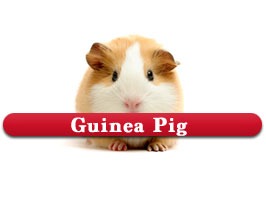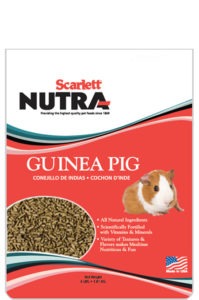 A proper diet is the cornerstone of good health for any pet. Guinea pigs require a balanced diet of hay, pellets, vegetables, and fruit. Learn what foods are safe for your guinea pig to keep them happy and healthy throughout their lives.
A proper diet is the cornerstone of good health for any pet. Guinea pigs require a balanced diet of hay, pellets, vegetables, and fruit. Learn what foods are safe for your guinea pig to keep them happy and healthy throughout their lives.
Grass Hay: The most important part of a guinea pigs diet is grass hay. It is available in many varieties, and is a great source of fiber for your guinea pig. Botanical, oat, and timothy hay can be enjoyed by guinea pigs of any age. Alfalfa hay should be reserved for pregnant, nursing, or young guinea pigs (6 months and younger), as alfalfa has a high calcium content and can cause stomach problems in adult guinea pigs.
 Pellets: Guinea pigs are herbivores, so a majority of their diet should be nutrient-packed pellets. They provide guinea pigs with their daily dose of Vitamin C, as well as other minerals and nutrients. Pellets made with nuts, animal by-products, or corn should be avoided, as they can harm your guinea pig. Always purchase fresh pellets with a “Sell By” date, and store them in a cool, dry place to ensure they stay fresh.
Pellets: Guinea pigs are herbivores, so a majority of their diet should be nutrient-packed pellets. They provide guinea pigs with their daily dose of Vitamin C, as well as other minerals and nutrients. Pellets made with nuts, animal by-products, or corn should be avoided, as they can harm your guinea pig. Always purchase fresh pellets with a “Sell By” date, and store them in a cool, dry place to ensure they stay fresh.
Fruit: Guinea pigs love fresh fruits. It is safe to feed your guinea pig apples, blueberries, oranges, pears, peaches, pineapples, plums, raspberries, and strawberries. Tomatoes are okay, too! Remember to keep these serving sizes small (no larger than 1 cubic inch). When you introduce a new fruit into your guinea pig’s diet, be sure to start small. If they have an adverse reaction to a particular food, the effects won’t be as drastic if the serving size is small. Once you’ve figured out what your guinea pig enjoys, you can provide more to them in a serving.
Vegetables: When it comes to vegetables, guinea pigs should consume at least 3 servings per day. Give your guinea pig a variety of vegetables, from leafy greens to carrots and peas. Keep the amounts small (no more than 1 cup a day), and just like with fruits, remember to test out a small serving first. Guinea pigs love fresh vegetables, including romaine lettuce, tomatoes, green and red peppers, and even corn husks. Before you feed your guinea pig, be sure to give the veggie a cleaning to wash away any dirt.
Water: Don’t forget to give your guinea pig plenty of fresh, cold water daily. It’s easiest to use a drop bottle so the water doesn’t get contaminated. Avoid giving your guinea pig distilled or vitamin-packed water, as these elements can be difficult for your guinea pig to break down.
Foods to Avoid: There are certain foods that are not safe for guinea pigs to eat. They cannot have a lot of “human snacks,” including cookies and chocolate, because their digestive systems can’t break down these types of food. This can lead to an overgrowth of toxic bacteria in their intestines and cause poisoning. Also avoid sugary fruits like bananas, grapes and melons. Vegetables that can cause bloating and discomfort include beans, bok choy, broccoli, cauliflower and cabbage, so avoid feeding those to your guinea pig as well. Other vegetables, like celery, have stringy pieces in them that can be dangerous to your guinea pigs digestive system.
Keep your guinea pig happy and healthy with these diet tips! Find vitamin-packed guinea pig pellets online with ease at Scarlett Pet Food today!
